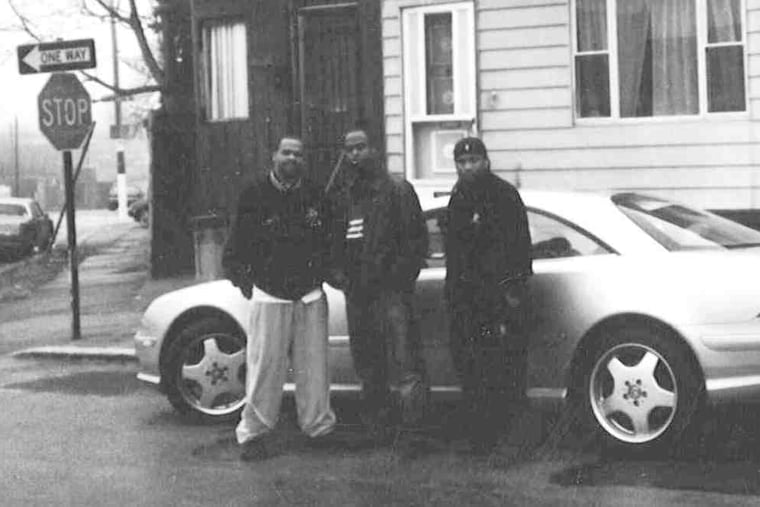North Philly drug kingpin Kaboni Savage had his death sentence commuted by President Joe Biden
Savage — who was on federal death row for 12 murders, including a 2004 firebombing that killed four children and two adults — will now serve a life sentence instead.

Notorious North Philadelphia drug kingpin Kaboni Savage, who was on federal death row for 12 murders — including a 2004 firebombing that targeted a witness and killed four children and two adults — had his sentence commuted Monday to life in prison. Savage is one of 37 federal death row inmates who was granted similar relief by President Joe Biden in one of his last acts in the White House.
As a result of Biden’s decision, Savage, who was convicted of the murders in 2013 and had largely been unrepentant, will be spared from potential execution and instead serve life in prison without the possibility of parole.
Savage, a former boxer who rose through the ranks of the drug dealing world to become a major trafficker, became known as one of the city’s most ruthless crime lords, wielding violence as a blunt tool to build his empire in the late 1990s and early 2000s.
While in solitary confinement awaiting trial in federal court, Savage ordered the 2004 firebombing of a home in North Philadelphia that killed family members of Eugene Coleman, a former associate who had agreed to help the FBI build a case against him.
The firebombing killed two adults and four children, including Coleman’s 15-month-old son, and prosecutors later revealed that Savage had been captured on secretly recorded prison tapes joking about it, saying Coleman should pour barbecue sauce on his relatives who had been burned to death.
In 2020, a federal appeals court affirmed Savage’s death sentence. He was the only Philadelphian on federal death row in recent years.
Along with Savage, Biden commuted sentences for people from other states who were convicted of killing police and military officers, people involved in deadly bank robberies or drug deals, and people convicted of killings guards or prisoners in federal facilities.
Still, the president chose not to commute the sentences of three federal inmates: Dylann Roof, who carried out the 2015 racist slayings of nine Black members of Mother Emanuel AME Church in Charleston, S.C.; 2013 Boston Marathon bomber Dzhokhar Tsarnaev; and Robert Bowers, who fatally shot 11 congregants at Pittsburgh’s Tree of life Synagogue in 2018, the deadliest antisemitic attack in U.S history.
In a statement, the White House said Biden “believes that America must stop the use of the death penalty at the federal level, except in cases of terrorism and hate-motivated mass murder — which is why today’s actions apply to all but those cases.”
Biden’s decision came just weeks before he is set to leave office, and as Donald Trump is preparing to be sworn-in for his second term. Trump is widely expected to resume federal executions, and said on the campaign trail that the death penalty — which in federal court is reserved for crimes including murder, espionage, or treason — should be expanded to be applicable to drug dealers and human traffickers as well.
The Biden administration in 2021 announced a moratorium on federal executions to study the protocols. And he had promised to go further on the issue in the past, saying on the campaign trail that he wanted to end all federal executions — including those related to crimes of terrorism and hate-motivated, mass killings. Once in office, however, Biden did not take action to try to outlaw the practice permanently.
The ACLU on Monday applauded Biden’s commutations, calling the decision a substantial first step in the push to outlaw capital punishment, which the organization sees as “inhumane.”
“President Biden has reaffirmed the power of redemption over retribution and reminds us that state-sanctioned killing does not make us safer,” the ACLU said in a statement. “The ACLU has long advocated against the death penalty and shed light on its fundamental flaws: it is error prone, racially biased, and a drain on public resources.”
Biden’s decision relates only to capital convictions secured in federal court. The death penalty is still legal in Pennsylvania for convictions secured by local prosecutors in state courts, although Gov. Josh Shapiro has extended a moratorium on executions started by his predecessor — fellow Democrat Tom Wolf — and last year called on the legislature to abolish capital punishment. Lawmakers haven’t taken action to do so.
Pennsylvania hasn’t executed anyone since 1999, when Gary Heidnik — who raped and tortured six women he kept chained in the basement of his Franklinville home, two of whom he killed — was put to death by lethal injection.
There were 13 federal executions during Trump’s first term — the first federal executions in two decades, and the most under one president in modern history.
The final three executions occurred after the 2020 election but before he left office — the first time a lame duck president had put federal prisoners to death since Grover Cleveland in 1889.
Biden faced recent pressure from advocacy groups urging him to act to make it more difficult for Trump to increase the use of capital punishment for federal inmates.
The president’s announcement also came less than two weeks after he commuted the sentences of roughly 1,500 people and pardoned 39 others convicted of nonviolent crimes, the largest single-day act of clemency in modern history.
One of those who received a commutation was former Luzerne County Judge Michael T. Conahan, who’d been sentenced to 17 ½ years in federal prison for accepting kickbacks to send children to a private prison. Biden’s decision in that case was criticized by officials including Shapiro, who called it “absolutely wrong.”
The Associated Press contributed to this article.